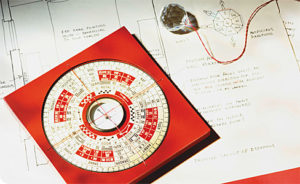We may no longer find it hard to pronounce, but its still easy to underestimate the power and complexity of feng shi.
By Adrea Renskoff
The Feng Shui Compass
Feng shui has made its way into everyday speech. We sometimes hear it used casually as a verb, e. g., “We really need feng shui our kitchen.” Or as an adjective, as in “This relaxation room has a feng shui vibe.” Such vague remarks end to reduce this ancient Chinese art/science to the shuffling of a few stick of furniture – and to it’s great disservice. Applied properly, the philosophy and practices of feng shui can nurture health, happiness and success.
Feng shui consultants draw on wisdom handed down for generations. An environment is oriented using two tools: the compass and the bagua.
The compass, or lo pan (“lo” meaning “everything” and “pan” meaning “bowl”) uses direction, such as which way a building faces, to empower energy patterns. This idea can be used figuratively as well: “We may also look at someone’s ming gua, a personal direction base on their birthday,” says Wendell.

 Feng Shui Lecture at Columbia University, Oct. 29, 2014
Feng Shui Lecture at Columbia University, Oct. 29, 2014